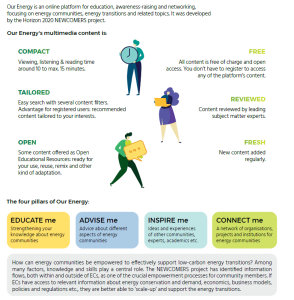8
Julia Blasch; Iva Đekić Tajnšek; and Mojca Drevenšek

Communications
How can energy communities be empowered to effectively support low-carbon energy transitions? Among many factors, knowledge and skills play a central role. The NEWCOMERS project has identified information flows, both within and outside of ECs, as one of the crucial empowerment processes for community members. If ECs have access to relevant information about energy conservation and demand, economics, business models, policies and regulations etc., they are better able to ‘scale-up’ and support the energy transitions.
Knowledge in energy communities
The NEWCOMERS research findings on energy communities show that ECs often develop so-called ‘knowledge banks’: these refer to specific knowledge and skills, related to ECs’ practical operations and development that members acquire by being part of a community. First, the ECs share pieces of knowledge from these knowledge banks within the community. They may then also share between each other, if they collaborate with other ECs. In this way, their knowledge is eventually also ‘diffused’ to the outside.
External knowledge diffusion is extremely valuable for the energy transition. NEWCOMERS research has shown that most energy community members share the knowledge they have accumulated and created in the community with their close social circles. Some do this informally, while some become more formal ambassadors, in some communities even official promoters.
To help ECs with knowledge diffusion, the NEWCOMERS project has developed the Our Energy platform. The aim of the platform is to share knowledge and experience from energy communities and experts, as well as to establish a network of stakeholders – projects, communities, policy and decision-makers and experts, offering communities the possibility to share, collaborate, learn and network – therefore making the co-learning and knowledge sharing processes more accessible. The platform offers energy related educational, advisory and inspirational content and also features a database of experts, projects, organisations and communities. With this, the NEWCOMERS project aims to build a network of practitioners and experts, willing to share their knowledge and best practices and connect to jointly achieve a better future. To make this accessible to everyone, the NEWCOMERS project tries to follow the principles of Open Education.
Another way to co-learn, connect, collaborate and network in a more structured and planned way are communities of practice.
What are Communities of Practice (CoP)?
A Community of Practice is a group of people who share a common concern, a set of problems, or an interest in a topic, and who come together to fulfill both individual and group goals. They often focus on sharing best practices and creating new knowledge to advance a domain of professional practice. Interaction on an ongoing basis is an important part of this.
While ‘Community of Practice’ is a broad concept, there are three characteristics every community of practice has. A shared domain or a topic of concern, which creates a common ground; a community, meaning they pursue their joint interest through shared activities; and practice, meaning that the community members are actual practitioners in this domain of interest.
The benefits of using CoP principles in energy communities
Communities of Practice have existed for a long time and have been building networks, skills and knowledge in many different areas. In fact, they occur everywhere – energy communities themselves can be Communities of Practice. Knowledge, skills and the transmission of knowledge are essential parts of energy communities. Applying CoP’s principles can provide energy communities with an effective knowledge and skill sharing network among the members as well as with other stakeholders, such as policy makers, industry actors and other energy communities. Using these practices can help communities to:
- Spread best practices internally and externally
- Solve problems
- Develop skills needed for successful energy community management and upkeep
- Develop relationships between members
- Connect and network with stakeholders
- Recruit new members
